- Home
- David Gemmell
Wolf in Shadow
Wolf in Shadow Read online
From his position above the campsite, Shannow watched the Zealots approach. His pistols leveled on the two men closest to Batik, he squeezed the triggers, and flame blossomed. The first of his targets was hurled from his feet; the second was slammed sideways as a bullet lodged in his brain.
Batik rolled from his blankets, pistol in hand. The third attacker fired, the bullet kicking up dirt some inches to Batik’s right. His own pistol thundered a reply, and the man was thrown backward.
Shannow, meanwhile, had turned his guns on the men by his own blanket. He killed one of them, but the second sprinted for the slope. Batik fired twice, missing his target, then lunged to his feet and gave chase.
The Zealot was almost to the foot of the slope when he whirled and fired, the shell whistling past Batik’s ear. Batik took aim and pulled the trigger, but there was a dull click.
The Zealot grinned and raised his own pistol …
By David Gemmell
Published by Ballantine Books
LION OF MACEDON
DARK PRINCE
ECHOES OF THE GREAT SONG
KNIGHTS OF DARK RENOWN
MORNINGSTAR
DARK MOON
IRONHAND’S DAUGHTER
THE HAWK ETERNAL
THE DRENAI SAGA
LEGEND
THE KING BEYOND THE GATE
QUEST FOR LOST HEROES
WAYLANDER
IN THE REALM OF THE WOLF
THE FIRST CHRONICLES OF DRUSS THE LEGEND
THE LEGEND OF DEATHWALKER
WINTER WARRIORS
HERO IN THE SHADOWS
WHITE WOLF
THE SWORDS OF NIGHT AND DAY
THE STONES OF POWER CYCLE
GHOST KING
LAST SWORD OF POWER
WOLF IN SHADOW
THE LAST GUARDIAN
BLOODSTONE
THE RIGANTE
SWORD IN THE STORM
MIDNIGHT FALCON
RAVENHEART
STORMRIDER
TROY
LORD OF THE SILVER BOW
SHIELD OF THUNDER
FALL OF KINGS
A Del Rey® Book
Published by The Random House Publishing Group
Copyright © 1987 by David A. Gemmell
All rights reserved.
Published in the United States by Del Rey Books, an imprint of The Random House Publishing Group, a division of Random House, Inc., New York. Originally published in Great Britain in 1987 by Century Hutchinson Ltd. First published in the United States by Baen Books under the title The Jerusalem Man.
Del Rey is a registered trademark and the Del Rey colophon is a trademark of Random House, Inc.
www.delreybooks.com
Library of Congress Catalog Card Number: 96-92738
eISBN: 978-0-307-79746-9
v3.1
This novel is dedicated to the memory of “Lady” Woodford, who believed in love, courage, and friendship and gave those who knew her fresh insights into the meaning of all three. Sleep well, lady.
And to Ethel Osborne, her sister, for a lifetime of love and care.
Acknowledgments
Nothing is created in a vacuum, and I am grateful to many people for their help in the creation of Wolf in Shadow. My thanks to Elizabeth Reeves, my editor, for bringing me out of the mist; to Peter Austin for the wagon master; and to Jean Maund, Stella Graham, Tom Taylor, Ross Lempriere, Ivan Kellham, and Tony Fenelon for invaluable assistance.
Thanks also to Jeremy Wells for loyalty and friendship in a world that rarely understands either.
Contents
Cover
Other Books by This Author
Title Page
Copyright
Dedication
Acknowledgments
Prologue
Chapter 1
Chapter 2
Chapter 3
Chapter 4
Chapter 5
Chapter 6
Chapter 7
Chapter 8
Chapter 9
Chapter 10
Chapter 11
Chapter 12
Chapter 13
Epilogue
Prologue
THE HIGH PRIEST lifted his bloodstained hands from the corpse and dipped them in a silver bowl filled with scented water. The blood swirled around the rose petals floating there, darkening them and glistening like oil. A young acolyte moved to kneel before the king, his hands outstretched. The king leaned forward, placing a large oval stone in his palms. The stone was red-gold and veined with thick black streaks. The acolyte carried the stone to the corpse, laying it on the gaping wound where the girl’s heart had been. The stone glowed, the red-gold gleaming like an eldritch lantern, the black veins shrinking to fine hairlines. The acolyte lifted the stone once more, wiped it with a cloth of silk, and returned it to the king before backing away into the shadows.
A second acolyte approached the high priest, bowing low. In his arms he held the red ceremonial cape, which he lifted over the priest’s bald head.
The king clapped his hands twice, and the girl’s body was lifted from the marble altar and carried down the long hall to oblivion.
“Well, Achnazzar?” demanded the king.
“As you can see, my lord, the girl was a powerful ESPer, and her essence will feed many stones before it fades.”
“The death of a pig will feed a stone, priest. You know what I am asking,” said the king, fixing Achnazzar with a piercing glare. The bald priest bowed low, keeping his eyes on the marble floor.
“The omens are mostly good, sire.”
“Mostly? Look at me!” Achnazzar raised his head, steeling himself to meet the burning eyes of the Satanlord. The priest blinked and tried to look away, but Abaddon’s glare held him trapped, almost hypnotized. “Explain yourself.”
“The invasion, lord, should proceed favorably in the spring. But there are dangers … not great dangers,” he added hurriedly.
“From which area?”
Achnazzar was sweating as he licked dry lips with a dry tongue.
“Not an area, lord, but three men.”
“Name them.”
“Only one can be identified; the others are hidden. But we will find them. The one is called Shannow. Jon Shannow.”
“Shannow? I do not know the name. Is he a leader of men or a brigand chief?”
“No, lord. He rides alone.”
“Then how is he a danger to the Hellborn?”
“Not to the Hellborn, sire, but to you.”
“You consider there is a difference?”
Achnazzar blanched and blinked the sweat from his eyes. “No, lord, I meant merely that the threat is to you as a man.”
“I have never heard of this Shannow. Why should he threaten me?”
“There is no sure answer, sire, but he follows the old, dead god.”
“A Christian?” spit Abaddon. “Will he seek to kill me with love?”
“No, lord, I meant the old dark god. He is a brigand slayer, a man of sudden violence. There is even some indication that he is insane.”
“How do these indications manifest themselves—apart from his religious stupidity?”
“He is a wanderer, lord, searching for a city that ceased to exist during blessed Armageddon.”
“What city?”
“Jerusalem, lord.”
Abaddon chuckled and leaned back on his throne, all tension fading. “That city was destroyed by a tidal wave three hundred years ago—by the great mother of all tidal waves. A thousand feet of surging ocean drowned that pestilential place, signaling the reign of the master and the death of Jehovah. What does Shannow hope to find in Jerusalem?”
“We do not know, lord.”
“And why is he a th
reat?”
“In every chart, or seer dream, his line crosses yours. Karmically you are bonded. It is so with the other two; in some way Shannow has touched—or will touch—the lives of two men who could harm you. We cannot identify them yet, but we will. For now they appear as shadows behind the Jerusalem Man.”
“Shannow must die … and swiftly. Where is he now?”
“He is at present some months journey to the south, nearing Rivervale. We have a man there, Fletcher. I shall get word to him.”
“Keep me informed, priest.”
As Achnazzar backed away from his monarch, Abaddon rose from the ebony throne and wandered to the high arched window, gazing over New Babylon. On a plain to the south of the city the Hellborn army was gathering for the raids of the Blood Feast. By winter the new guns would be distributed, and the Hellborn would ready themselves for the spring war: ten thousand men under the banner of Abaddon, sweeping into the south and west, bringing the new world into the hands of the last survivor of the Fall.
And they warned him of one madman?
Abaddon raised his arms. “Come to me, Jerusalem Man.”
1
THE RIDER PAUSED at the crest of a wooded hill and gazed down over the wide rolling empty lands beneath him.
There was no sign of Jerusalem, no dark road glittering with diamonds. But then, Jerusalem was always ahead, beckoning in the dreams of night, taunting him to find it on the black umbilical road.
His disappointment was momentary, and he lifted his gaze to the far mountains, gray and spectral. Perhaps there he would find a sign. Or was the road covered now by the blown dust of centuries, disguised by the long grass of history?
He dismissed the doubt; if the city existed, Jon Shannow would find it. Removing his wide-brimmed leather hat, he wiped the sweat from his face. It was nearing noon, and he dismounted. The steeldust gelding stood motionless until he looped the reins over its head, then dipped its neck to crop at the long grass. The man delved into a saddlebag to pull clear his ancient Bible; he sat on the ground and idly opened the gold-edged pages.
“And Saul said to David, Thou art not able to go against this Philistine to fight with him, for thou art but a youth, and he is a man of war from his youth.”
Shannow felt sorry for Goliath, for the man had had no chance. A courageous giant, ready to face any warrior, had found himself opposite a child without sword or armor. Had he won, he would have been derided. Shannow closed the Bible and carefully packed it away.
“Time to move,” he told the gelding. He stepped into the saddle and swept up the reins. Slowly they made their way down the hillside, the rider’s eyes watchful of every boulder and tree, bush and shrub. They entered the cool of the valley, and Shannow drew back on the reins, turning his face to the north and breathing deeply.
A rabbit leapt from the brush, startling the gelding. Shannow saw the creature vanish into the undergrowth and then uncocked the long-barreled pistol, sliding it back into the scabbard at his hip. He could not recall drawing it clear. Such was the legacy of the years of peril: fast hands, a sure eye, and a body that reacted independently of the conscious mind.
Not always a good thing … Shannow would never forget the look of blank incomprehension in the child’s eyes as the lead ball had cleaved his heart, nor the way his frail body had crumpled lifeless to the earth. There had been three brigands that day, and one had shot Shannow’s horse out from under him while the other two ran forward with knife and ax. He had destroyed them all in scant seconds, but a movement behind had caused him to swivel and fire. The child had died without a sound.
Would God ever forgive him?
Why should he, when Shannow could not forgive himself?
“You were better off losing, Goliath,” said Shannow.
The wind changed, and a stomach-knotting aroma of frying bacon drifted to him from the east. Shannow tugged the reins to the right. After a quarter of a mile, the trail rose and fell and a narrow path opened onto a meadow and a stone-fronted farmhouse. Before the building was a vegetable garden, and beyond that was a paddock where several horses were penned.
There were no defense walls, and the windows of the house were wide and open. To the left of the building the trees had been permitted to grow to within twenty yards of the wall, allowing no field of fire to repel brigands. Shannow sat and stared for some time at this impossible dwelling. Then he saw a child carrying a bucket emerge from the barn beyond the paddock. A woman walked out to meet him and ruffled his blond hair.
Shannow scanned the fields and meadows for sign of a man. At last, satisfied that they were alone, he edged the gelding out onto open ground and approached the building. The boy saw him first and ran inside the house.
Donna Taybard’s heart sank as she saw the rider, and she fought down panic as she lifted the heavy crossbow from the wall. Placing her foot in the bronze stirrup, she dragged back on the string but could not nock it.
“Help me, Eric.” The boy joined her, and together they cocked the weapon. She slid a bolt into place and stepped onto the porch. The rider had halted some thirty feet from the house, and Donna’s fear swelled as she took in the gaunt face and deep-set eyes shadowed under the wide-brimmed hat. She had never seen a brigand, but had anyone asked her to imagine one, this man would have leapt from her nightmares. She lifted the crossbow, resting the heavy butt against her hip.
“Ride on,” she said. “I have told Fletcher we shall not leave, and I will not be forced.”
The rider sat very still, then removed his hat. His hair was shoulder-length and black, streaked with silver, and his beard showed a white fork at the chin.
“I am a stranger, lady, and I do not know this Fletcher. I do not seek to harm you—I merely smelled the bacon and would trade for a little. I have Barta coin and—”
“Leave us alone,” she shouted.
The crossbow slipped from her grip, dropping the trigger bar against her palm. The bolt flashed into the air, sailing over the rider and dropping by the paddock fence. Shannow walked his horse to the paddock and dismounted, retrieving the bolt. Leaving the gelding, he strolled back to the house.
Donna dropped the bow and pulled Eric into her side. The boy was trembling, but in his hand he held a long kitchen knife; she took it from him and waited as the man approached. As he walked, he removed his heavy leather topcoat and draped it over his arm. It was then that she saw the heavy pistols at his side.
“Don’t kill my boy,” she said.
“Happily, lady, I was speaking the truth: I mean you no harm. Will you trade a little bacon?” He picked up the bow and swiftly nocked it, slipping the bolt into the gully. “Would you feel happier carrying this around?”
“You are truly not with the Committee?”
“I am a stranger.”
“We are about to take food. If you wish, you may join us.”
Shannow knelt before the boy. “May I enter?” he asked.
“Could I stop you?” the boy returned bitterly.
“With just one word.”
“Truly?”
“My faults are many, but I do not lie.”
“You can come in, then,” said the boy, and Shannow walked ahead with the child trailing behind. He mounted the porch steps and entered the cool room beyond, which was spacious and well constructed. A white stone hearth held a woodstove and an iron oven; at the center of the room was a handsomely carved table and a wooden dresser bearing earthenware plates and pottery mugs.
“My father carved the table,” said the boy. “He is a skilled carpenter—the best in Rivervale—and his work is much sought after. He made the comfort chair, too, and cured the hides.” Shannow made a show of admiring the leather chair by the woodstove, but his eyes followed the movements of the petite blond woman as she prepared the table.
“Thank you for allowing me into your home,” said Shannow gravely.
She smiled for the first time and wiped her hand on her canvas apron. “I am Donna Taybard,” she told him,
offering her hand.
He took it and kissed her fingers lightly. “And I am Jon Shannow, a wanderer, lady, in a strange land.”
“Be welcome, then, Jon Shannow. We have some potatoes and mint to go with the bacon, and the meal will be ready within the hour.”
Shannow moved to the door, where pegs had been hammered home. He unbuckled his scabbard belt and hung his side arms beside his coat. Turning back, he saw the fear once more in her eyes.
“Be not alarmed, Fray Taybard; a wandering man must protect himself. It does not change my promise; that may not be so with all men, but my spoken word is iron.”
“There are few guns in Rivervale, Mr. Shannow. This was … is … a peaceful land. If you would like to wash before eating, there is a pump behind the house.”
“Do you have an ax, lady?”
“Yes. In the woodshed.”
“Then I shall work for my supper. Excuse me.”
He walked out into the fading light of dusk and unsaddled the gelding, leading him into the paddock and releasing him among the other three horses. Then he carried his saddle and bags to the porch before fetching the ax. He spent almost an hour preparing firewood before stripping to the waist and washing himself at the pump. The moon was up when Donna Taybard called him in. She and the boy sat at one end of the table, having set his place apart and facing the hearth. He moved his plate to the other side and seated himself facing the door.
“May I speak a word of thanks, Fray Taybard?” asked Shannow as she filled the plates. She nodded. “Lord of Hosts, our thanks to thee for this food. Bless this dwelling and those who pass their lives here. Amen.”
“You follow the old ways, Mr. Shannow?” asked Donna, passing a bowl of salt to the guest.
“Old? It is new to me, Fray Taybard. But yes, it is older than any man knows and a mystery to this world of broken dreams.”
“Please do not call me Fray; it makes me feel ancient. You may call me Donna. This is my son, Eric.”
Shannow nodded toward Eric and smiled, but the boy looked away and continued to eat. The bearded stranger frightened him, though he was anxious not to show it. He glanced at the weapons hanging by the door.

 Bloodstone
Bloodstone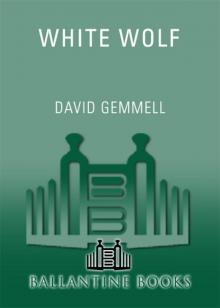 White Wolf
White Wolf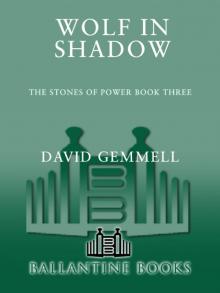 Wolf in Shadow
Wolf in Shadow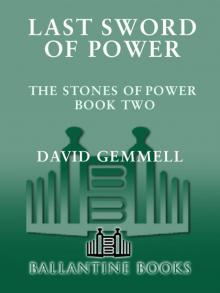 Last Sword of Power
Last Sword of Power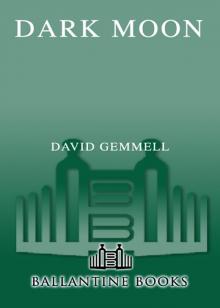 Dark Moon
Dark Moon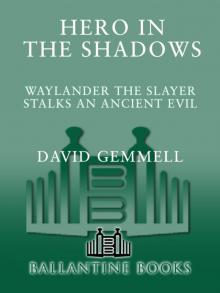 Hero in the Shadows
Hero in the Shadows Gemmell, David - Drenai 09 - Hero In The Shadows
Gemmell, David - Drenai 09 - Hero In The Shadows Waylander
Waylander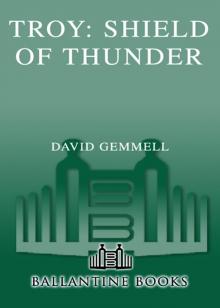 Shield of Thunder
Shield of Thunder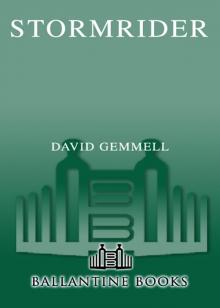 Stormrider Stormrider
Stormrider Stormrider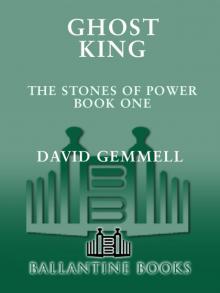 Ghost King
Ghost King Legend
Legend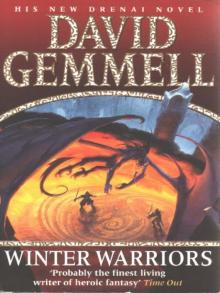 Winter Warriors
Winter Warriors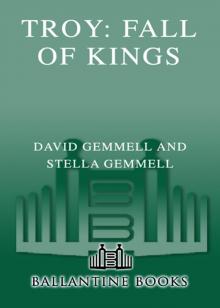 Fall of Kings
Fall of Kings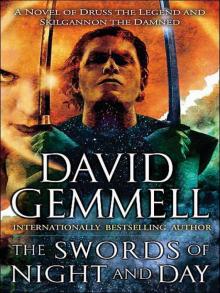 The Swords of Night and Day
The Swords of Night and Day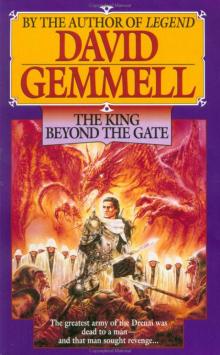 The King Beyond the Gate
The King Beyond the Gate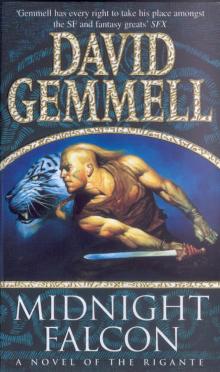 Midnight Falcon
Midnight Falcon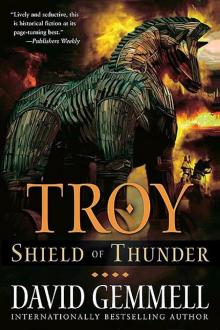 02 - Shield of Thunder
02 - Shield of Thunder In the Realm of the Wolf
In the Realm of the Wolf Ravenheart
Ravenheart The First Chronicles of Druss the Legend
The First Chronicles of Druss the Legend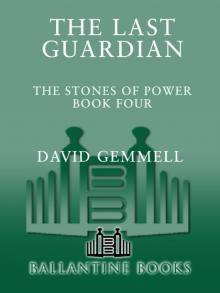 Last Guardian
Last Guardian Stormrider
Stormrider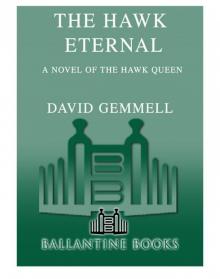 The Hawk Eternal
The Hawk Eternal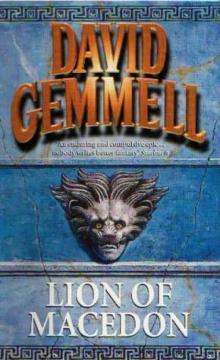 Lion of Macedon
Lion of Macedon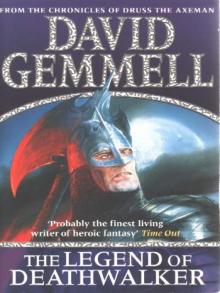 The Legend of Deathwalker
The Legend of Deathwalker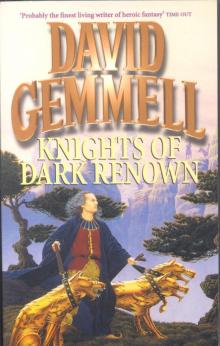 Knights of Dark Renown
Knights of Dark Renown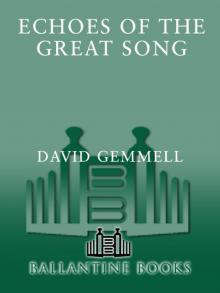 Echoes of the Great Song
Echoes of the Great Song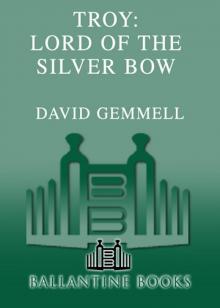 Lord of the Silver Bow
Lord of the Silver Bow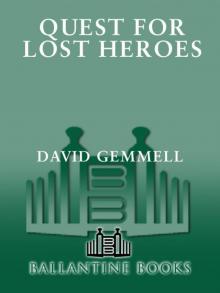 Quest for Lost Heroes
Quest for Lost Heroes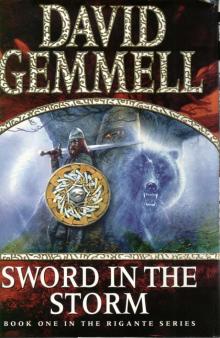 Sword in the Storm
Sword in the Storm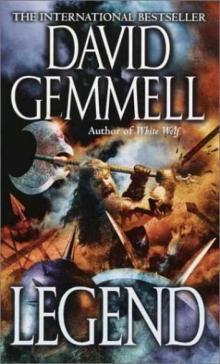 Drenai Saga 01 - Legend
Drenai Saga 01 - Legend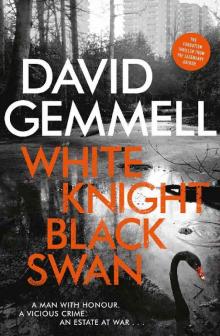 White Knight/Black Swan
White Knight/Black Swan![[Troy 02] - Shield of Thunder Read online](http://i1.bookreadfree.com/i/03/19/troy_02_-_shield_of_thunder_preview.jpg) [Troy 02] - Shield of Thunder
[Troy 02] - Shield of Thunder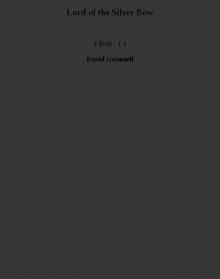 Lord of the Silver Bow t-1
Lord of the Silver Bow t-1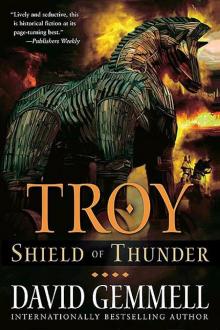 Shield of Thunder t-2
Shield of Thunder t-2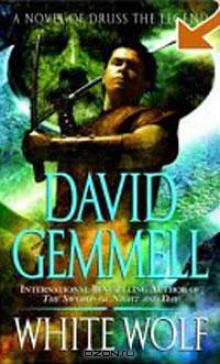 White Wolf: A Novel of Druss the Legend dt-10
White Wolf: A Novel of Druss the Legend dt-10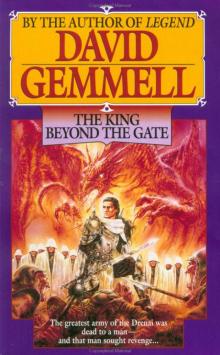 Drenai Saga 02 - The King Beyond the Gate
Drenai Saga 02 - The King Beyond the Gate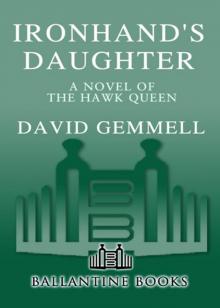 Ironhand's Daughter
Ironhand's Daughter Gemmell, David - Drenai 06 - The First Chronicles of Druss the Legend
Gemmell, David - Drenai 06 - The First Chronicles of Druss the Legend The Last Guardian
The Last Guardian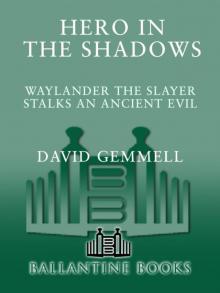 Hero in the Shadows: A Waylander the Slayer Novel
Hero in the Shadows: A Waylander the Slayer Novel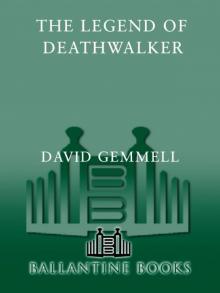 The Legend of the Deathwalker
The Legend of the Deathwalker